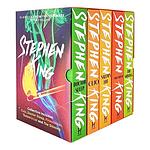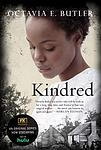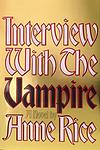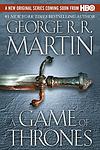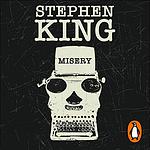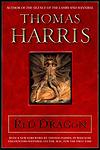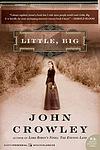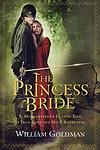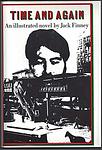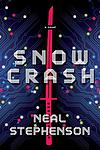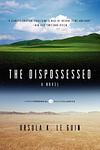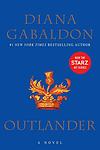The Greatest American "Fiction, Speculative Fiction" Books Since 1970
Click to learn how this list is calculated.
This list represents a comprehensive and trusted collection of the greatest books. Developed through a specialized algorithm, it brings together 288 'best of' book lists to form a definitive guide to the world's most acclaimed books. For those interested in how these books are chosen, additional details can be found on the rankings page.
Genres
Speculative fiction is an umbrella genre encompassing narrative fiction with supernatural or futuristic elements. This includes genres such as science fiction, fantasy, horror, supernatural fiction, superhero fiction, utopian and dystopian fiction, apocalyptic and post-apocalyptic fiction, and alternate history. The unifying factor of speculative fiction is its departure from the narrative constraints of reality, exploring imaginative and often profound questions that challenge our understanding of the world and our place within it. These stories often delve into themes like the human condition, social commentary, and the exploration of philosophical and ethical dilemmas through the lens of the fantastical or the yet-to-be-possible. By pushing the boundaries of the known, speculative fiction invites readers to consider the myriad possibilities of existence and the potential consequences of our actions in worlds that are, at once, vastly different from and eerily similar to our own.
Countries
Date Range
Reading Statistics
Click the button below to see how many of these books you've read!
Download
If you're interested in downloading this list as a CSV file for use in a spreadsheet application, you can easily do so by clicking the button below. Please note that to ensure a manageable file size and faster download, the CSV will include details for only the first 500 books.
Download-
1. Beloved by Toni Morrison
This novel tells the story of a former African-American slave woman who, after escaping to Ohio, is haunted by the ghost of her deceased daughter. The protagonist is forced to confront her repressed memories and the horrific realities of her past, including the desperate act she committed to protect her children from a life of slavery. The narrative is a poignant exploration of the physical, emotional, and psychological scars inflicted by the institution of slavery, and the struggle for identity and self-acceptance in its aftermath.
-
2. Gravity's Rainbow by Thomas Pynchon
Set during the end of World War II, the novel follows Tyrone Slothrop, a lieutenant in the U.S. Army, as he tries to uncover the truth behind a mysterious device, the "Schwarzgerät", that the Germans are using in their V-2 rockets. The narrative is complex and multi-layered, filled with a vast array of characters and subplots, all connected by various themes such as paranoia, technology, and the destructive nature of war. The book is known for its encyclopedic nature and its challenging, postmodernist style.
-
3. The Shining by Stephen King
A recovering alcoholic accepts a job as a winter caretaker at a remote Colorado hotel, hoping the isolation will help him reconnect with his wife and young son, and work on his writing. However, the hotel has a dark history and a powerful malevolent presence that influences him into violence, while his psychic son sees horrific forebodings from both past and future. As the winter weather leaves them snowbound, the father's sanity deteriorates, leading to a terrifying climax.
-
4. The Stand by Stephen King
This post-apocalyptic horror/fantasy novel presents a world devastated by a deadly plague, killing 99% of the population. The survivors, drawn together by dreams of a charismatic and benevolent figure, gather in Boulder, Colorado to form a new society. However, a malevolent figure also emerges, attracting a following of his own and setting the stage for a classic battle between good and evil. The story delves into themes of community, morality, and the capacity for both destruction and regeneration within humanity.
-
5. Neuromancer by William Gibson
In this groundbreaking cyberpunk novel, a washed-up computer hacker is hired by a mysterious employer to pull off the ultimate hack. As he navigates a dystopian future filled with artificial intelligence, corporate espionage, and virtual reality, he must confront his own past and the dark realities of the digital world. The narrative explores themes of technology, identity, and consciousness, pushing the boundaries of science fiction literature.
-
6. The Road by Cormac McCarthy
In a post-apocalyptic world, a father and his young son journey through a desolate landscape, struggling to survive. They face numerous threats including starvation, extreme weather, and dangerous encounters with other survivors. The father, who is terminally ill, is driven by his love and concern for his son, and is determined to protect him at all costs. The story is a haunting exploration of the depths of human resilience, the power of love, and the instinct to survive against all odds.
-
7. American Psycho by Bret Easton Ellis
The novel is a disturbing and graphic exploration of the mind of a wealthy, young and handsome Wall Street investment banker who is also a psychopathic serial killer. He leads a double life, appearing to be a charming and sophisticated businessman by day, while indulging in horrific acts of violence and murder by night. The narrative provides a satirical critique of 1980s American consumer culture, vanity, and excess, while also delving into the dark underbelly of human nature.
-
8. Kindred by Octavia E. Butler
"Kindred" is a gripping and thought-provoking novel that follows the life of Dana, a young African American woman living in the 1970s. Suddenly, she finds herself inexplicably transported back in time to the early 19th century, where she becomes entangled in the lives of her ancestors, who are enslaved on a plantation. As Dana navigates the brutal realities of slavery, she grapples with her own identity, the complexities of race, and the enduring legacy of the past. With its powerful storytelling and exploration of the connections between past and present, "Kindred" is a profound examination of history, race, and the enduring resilience of the human spirit.
-
9. Watchmen by Alan Moore
Set in an alternate history where superheroes emerged in the 1940s and 1980s, the story follows a group of retired superheroes who are brought out of retirement after the murder of one of their own. As they investigate, they uncover a plot that could change the course of history and the balance of world power. The book explores complex themes such as the morality of power, the definition of heroism, and the value of human life.
-
10. Interview with the Vampire by Anne Rice
The novel is a dark and atmospheric tale of a centuries-old vampire, Louis, who shares his life story with a young reporter. He recounts his transformation into a vampire by the charismatic and ruthless Lestat, their complex relationship, and their encounters with other supernatural beings. The narrative explores themes of immortality, loss, identity, and the human desire for love and companionship. The book is known for its rich detail and its philosophical and historical depth.
-
11. A Game of Thrones by George R. R. Martin
This epic fantasy novel is set in the Seven Kingdoms of Westeros, where 'summers span decades and winters can last a lifetime'. The story follows three main plot lines: the Stark family's struggle to control the North; the exiled Targaryen siblings' attempt to regain the throne; and the Night's Watch's fight against the supernatural beings beyond the Wall. As these stories intertwine, a game of power, politics, and survival unfolds, where you either win or you die.
-
12. The Giver by Lois Lowry
The book is set in a seemingly perfect community without war, pain, suffering, differences or choice, where everything is under control. The protagonist is chosen to learn from an elderly man about the true pain and pleasure of the "real" world. He discovers the dark secrets behind his fragile community and struggles to handle the burden of the knowledge of pain and the concept of individuality. He must decide whether to accept the status quo or break free, risking everything.
-
13. Misery by Stephen King
A successful novelist is rescued from a car crash by a deranged fan who is upset with the death of her favorite character from his books. Trapped in her remote home, the writer is subjected to physical and psychological torture as the fan forces him to write a new novel bringing the character back to life. As he writes for his life, he must also plan his escape before his captor's rage becomes deadly.
-
14. The Mists of Avalon by Marion Zimmer Bradley
This novel reimagines the Arthurian legends from the perspectives of the women involved. It centers around Morgaine, Arthur's half-sister, who is a priestess of Avalon, and Gwenhwyfar, Arthur's queen. The story explores their roles in the political and spiritual conflicts that arise as Christianity begins to replace the old pagan ways. It delves into themes of love, loyalty, and power, while offering a fresh take on a classic tale.
-
15. It by Stephen King
A group of seven childhood friends, known as The Losers Club, come together in their small hometown to confront an evil entity that they first battled as children. This malevolent force, which often takes the form of a terrifying clown, preys on the children of their town by exploiting their deepest fears. The friends must confront their own personal demons and past traumas in order to once again face this entity, and the novel alternates between their childhood and adult experiences with this evil.
-
16. Red Dragon by Thomas Harris
A former FBI profiler, who is renowned for capturing a notorious serial killer, is lured out of retirement to track down a new killer who has a taste for families. The new killer, dubbed "The Tooth Fairy", is a complex character with a troubled past that leads him to commit his heinous crimes. As the profiler delves deeper into the investigation, he is forced to confront his own demons and the manipulative games of the serial killer he previously captured, who is now behind bars.
-
17. Little, Big by John Crowley
"Little, Big" is a complex tale that weaves together elements of magical realism, fantasy, and family saga. The story follows the Drinkwater family who live in an eccentric house known as Edgewood, which is somehow bigger on the inside than the outside. The family is connected to the realm of Faerie, and the narrative explores their interactions with this magical world. The book spans multiple generations and intertwines the lives of its characters with the cycles of history and myth, creating a multi-layered narrative about love, family, destiny, and the nature of storytelling itself.
-
18. The Princess Bride by William Goldman
This book is an illustrated edition of a classic tale of true love and high adventure. It tells the story of a beautiful princess and her one true love. After he is reportedly killed, she agrees to marry a wicked prince instead, only to be kidnapped and face numerous dangers. The story is filled with humor, romance, and swashbuckling action, all brought to life by vivid illustrations.
-
19. Time and Again by Jack Finney
Time and Again is a science fiction novel that follows Simon Morley, a young advertising artist living in New York City, who is recruited by a secret government project to travel back in time to the year 1882. The novel explores themes of nostalgia, love, and the complexity of time travel, as Simon falls in love with a woman from the past and must decide whether to stay in the 19th century or return to his own time.
-
20. Ender's Game by Orson Scott Card
A young prodigy is enlisted into a military academy in space, where he is trained through complex war games to combat an impending alien invasion. Despite his initial struggles with isolation and manipulation by the academy's leaders, he rises through the ranks due to his strategic genius and leadership skills. The protagonist grapples with the moral implications of war and the cost of his own humanity, as he is groomed to be the Earth's ultimate weapon against the alien threat.
-
21. Snow Crash by Neal Stephenson
In a future America where the federal government has largely collapsed and been replaced by corporate entities, a computer hacker and pizza delivery driver becomes embroiled in a plot involving a dangerous new drug and a computer virus called "Snow Crash". He is joined by a teenage skateboard courier and a host of other characters in a high-stakes race to uncover the truth behind the virus and its origins in ancient Sumerian culture. The narrative explores themes of linguistics, philosophy, computer science, religion, and cryptography.
-
22. Dhalgren by Samuel R. Delany
The novel follows the journey of a poet with amnesia, known only as the Kid, through a dystopian city named Bellona. The city has been isolated from the rest of the world following a catastrophic event of unknown origin. The Kid navigates through a society where time, identity, and reality are all fluid, engaging with various groups of outcasts and explorers. The narrative is marked by its experimental style, incorporating elements of science fiction, surrealism, and metafiction.
-
23. The Dispossessed by Ursula K. Le Guin
The novel is a profound exploration of two vastly different societies on twin planets, Urras and Anarres. The protagonist is a brilliant physicist from Anarres, a planet with an anarchist society, who travels to Urras, a planet with a capitalist and authoritarian regime. The book explores his struggle to reconcile his anarchist beliefs with the stark realities of a different socio-political system. It's a thought-provoking investigation of human nature, power structures, and the idea of utopia.
-
24. The Hunger Games by Suzanne Collins
Set in a dystopian future, the novel revolves around a teenager named Katniss Everdeen, who lives in a post-apocalyptic nation where the government, in order to maintain control, forces each of its twelve districts to send a boy and girl to participate in a televised annual event. This event, known as the Hunger Games, is a fight to the death. When Katniss's younger sister is selected to participate, Katniss volunteers to take her place. The book follows her struggle for survival in the cruel game, against the backdrop of a brewing rebellion against the oppressive regime.
-
25. Outlander by Diana Gabaldon
The novel follows a World War II nurse who accidentally time travels back to 18th century Scotland. There, she meets a handsome and brave Scottish warrior and is torn between her loyalty to her husband in her own time and her growing love for the warrior. As she becomes more entwined in the past, she must navigate the dangers of a time not her own, including political unrest and violence, while trying to find a way back home.
Reading Statistics
Click the button below to see how many of these books you've read!
Download
If you're interested in downloading this list as a CSV file for use in a spreadsheet application, you can easily do so by clicking the button below. Please note that to ensure a manageable file size and faster download, the CSV will include details for only the first 500 books.
Download

